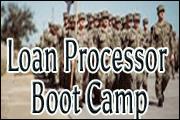Loan Processor Training
Best-Selling Training Courses:
Online Training Courses
How To Become A Loan Processor With Our Loan Processor Training Courses
What Is A Loan Processor? What Does A Loan Processor Do?While Loan Officers are responsible for generating loan business and taking the initial loan application, Loan Processors typically do the hard work of double checking the paperwork, correcting any errors, and corresponding with the underwriter to make sure the loan is approved.
Essentially, once a loan application is taken by the Mortgage Broker or Loan Officer, the corresponding paperwork is sent along to a Loan Processor. The Loan Processor is then responsible for prepping and organizing the file and getting it over to the bank or mortgage lender for approval.

This work includes:
- Organizing the loan application's documentation and makes sure it is in order
- Reviewing the loan package as given by the lender for completeness and accuracy
- Verifying the borrower's credit history in terms of debts and payments
- Checking appraisal and property issues requiring further justifications
- Determining if the application and ensuring requirements and paperwork comply with the lender's standards
- Contacting the borrower if information is missing or if additional information or documentation is required
The Key Components Of Mortgage Loan Processing
The mortgage loan processing involves several key components that are crucial for ensuring the smooth and efficient handling of mortgage applications. These components typically include:
- The Application:
The loan process begins with the borrower submitting a mortgage application that contains personal and financial information necessary for assessing the borrower's eligibility for a mortgage loan.
- Collecting And Reviewing Supporting Documentation:
Lenders require documents such as such as pay stubs, bank statements, and tax returns to verify the information provided in the application.
- The Credit Check Review:
Lenders will pull the borrower's credit report from one or more credit bureaus to assess the borrower's creditworthiness. This report provides information about the borrower's credit history, including their credit score and any outstanding debts or derogatory marks.
- The Appraisal:

An appraisal is conducted to determine the fair market value of the property being financed. This helps the lender ensure that the property is worth the amount being borrowed and serves as collateral for the loan.
- The Underwriting Process:
During underwriting, the lender evaluates the borrower's financial situation, credit history, and the property's appraisal to determine whether to approve the loan. This process essentially assessed the risk associated with lending to the borrower. In other words, it is an evaluation of the borrower's ability to re-pay the loan.
- Approval or Rejection:
Based on the underwriting process, the lender will either approve or reject the mortgage application. If approved, the borrower will receive a commitment letter outlining the terms and conditions of the loan.
- Closing:
The final step in the mortgage loan process is the closing, where the borrower and lender sign the necessary documents to complete the transaction. This may involve the payment of closing costs and the transfer of ownership of the property.
These components work together to ensure that the mortgage loan process is completed efficiently and in compliance with regulatory requirements.
Common Problems With The Mortgage Loan Process
Mortgage loan processing involves a series of steps, and errors can occur at various stages of the process. Some of the most common errors in mortgage loan processing include:
- Incomplete or Incorrect Information On The Application:
Bad or missing information - as well as the inability to verify income - are key issues in the loan processes.
- Credit Report Discrepancies:
Errors on the borrower's credit report, such as incorrect account information, can impact the loan approval process. Further, LTV or other factors can affect the lenders decision regarding whether to approve the loan. Again, the lender wants to be as sure as possible that the borrower can re-pay the loan.
- Failure To Disclose Liabilities:
Borrowers may fail to disclose all of their liabilities, such as outstanding debts or financial obligations, which can affect their ability to qualify for a mortgage loan. These items also can affect the terms of the loan. For instance, the lender might offer a loan, but at a higher interest rate.
- Changing Financial Circumstances:
Financial circumstances can change during the loan application process, such as a change in employment or income, which may require additional documentation or affect the loan approval decision.
- Missed Deadlines:
Missing deadlines for submitting documentation or meeting loan conditions can delay the mortgage loan process and potentially jeopardize the loan approval.
Find Loan Processor Training Courses
Our training for how to become a mortgage loan processor is designed by people who have been loan processors for years, so you get the benefit of their experience on how to become a mortgage loan processor. Here are a few of the things you will learn from taking our Loan Processor training courses:
- Mortgage Terminology
- Loan Ratio Calculations

- Loan Documentation
- Disclosures
- DTI Ratios
- ARMs
- LTVs
- Escrows
- Credit Reports
- Purchase Agreements
- Processor Duties
To find Loan Processor training courses, either select one of the recommended courses or "Loan Processor" from the "Professional Development" section of the search box below.
Best-Selling Training Courses:
Online Training Courses
Top FAQs
A mortgage processor is responsible for assembling, administering, and processing loan application paperwork before it gets approved.
A mortgage processor collects and reviews income, expenses, etc. If the information is favorable, the loan application is forwarded for loan underwriting. Essentially, the process determines the lender's ability to repay the loan.
While Mortgage Loan Officers must be licensed, most states do not require loan processors to be licensed. That said, be sure to check your state's requirements.
Depending on where you live, loan processors can expect to earn $50,000 or more.
Find Seminars, Webinars, And Online Training In Your Area
More About Mortgage Loan Processor Training
Mortgage processors are primarily tasked with ensuring all of the proper documentation is present in a borrower's file, that all numbers check out, and everything is organized in an orderly fashion.
Loan Processors start with a loan application, gather additional information, then send the 'package' to the mortgage underwriter. This process includes gathering all the necessary documentation required to start the loan approval process, including verifying employment, reviewing bank and credit card statements, monthly bills, tax returns, and othe income and expenses.
The Loan Processor then works with the Mortgage Underwriter to get and/or verify any additional information needed to approve the loan.
Loan processors also order tax transcripts from the IRS, verify Social Security numbers from the Social Security Administration and review the borrower's homeowners insurance policy to make sure there is adequate coverage and that the mortgage lender's information has been shared with the insurance company. They also double-check that the borrower has sufficient cash to close the mortgage transaction.
 Where Do Loan Processors Work?
Where Do Loan Processors Work? Loan processors are found in all kinds of financial institutions, including banks, credit unions, investment companies, auto dealerships, and other industries in which loans are brokered. Individuals with this type of financial skill set may also potentially find work in finance and accounting divisions, auditing companies and tax preparation companies.
What Education Is Needed To Be A Loan Processor? All that is needed for a career as a loan processor is a high school diploma. Nevertheless, some employers pursue loan processors who hold an associate's or bachelor's degree in a business-related area, such as accounting or business administration. Specific loan processing training programs are available as either certificate programs or single courses.
How To Become A Loan Processor
Becoming a Loan Processor is easy with our Loan Processor training courses. Simply select one of our recommended Loan Processor training courses from the list above, or use the search box by selecting "Loan Processor" from the "Professional Development" section of the search box. You also can...
Earn A Loan Processor Certification!
You can earn a Loan Processor certification by completing the
Certified Mortgage Processor certification program and passing the affiliated exam.
Our Certified Mortgage Processor program is ideal for loan processors looking to advance their mortgage processing career. Click the link above for more details or to order, or call us if you have questions or need assistance ordering.
 This work includes:
This work includes:



